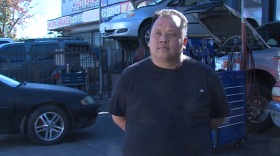Blanca, a 64-year-old Mexican immigrant, said losing her Medi-Cal coverage would be devastating.
We’re only using her first name to protect her identity.
Under Gov. Newsom’s proposal to offset the state deficit, immigrants without legal status already enrolled in Medi-Cal would face a $100 monthly premium starting in 2027. New applicants could be blocked from enrolling entirely as soon as 2026.
For Blanca, losing coverage would mean no access to doctors, medications, or preventative care.
Advocates say the state’s proposal to freeze that access, and to eliminate dental and long-term care for those already enrolled, will only shift costs down the line.
“When people don't have health coverage, they're waiting until it is in a more dire situation,” said Mayra Alvarez, president of The Children’s Partnership. “They are then using the emergency room for their care. And what does that do? That raises the cost for all of us.”
Laurel Lucia, director of the UC Berkeley Labor Center’s health care program, agreed.
“When people have Medicaid coverage, they're more likely to use primary and preventive care and less likely to use emergency room services,” she said. “That's a better use of health care dollars and it's better for people's health.”
California expanded Medi-Cal to undocumented adults in January 2024. A California Health Care Foundation study found 88% of those enrolled used primary, preventive, and dental care.
Lucia said federal law prohibits charging the poorest Medicaid patients, and Newsom’s fee would be unaffordable for most.
“We're talking about immigrants who earn $1,800 or less per month. That's the upper income limit for medi-cal eligibility for single adults,” she said.
La Maestra Community Health Centers, which serves a large immigrant population, saw a major influx of patients last year around the same time coverage was extended to undocumented adults.
“I want to say it was over a thousand new patients,” said Corrine Hanson, the clinic’s government affairs director.
She attributes the growth to a combination of clinic expansion and more people gaining insurance.
Now, with fewer patients expected to qualify and potential budget cuts ahead, she says clinics like hers may have to make tough choices.
“We would not want to close any clinics or stop providing services,” Hanson said. “But we would have to focus, you know, on our core services.”
State lawmakers are expected to debate the proposal in the coming weeks. In the meantime, patients like Blanca are left questioning how they will manage without coverage.
She said even if she ends up in the emergency room, she won’t be able to afford the medications doctors prescribe. Without Medi-Cal, she fears she’ll have no option but to rely on home remedies or go without care altogether.





